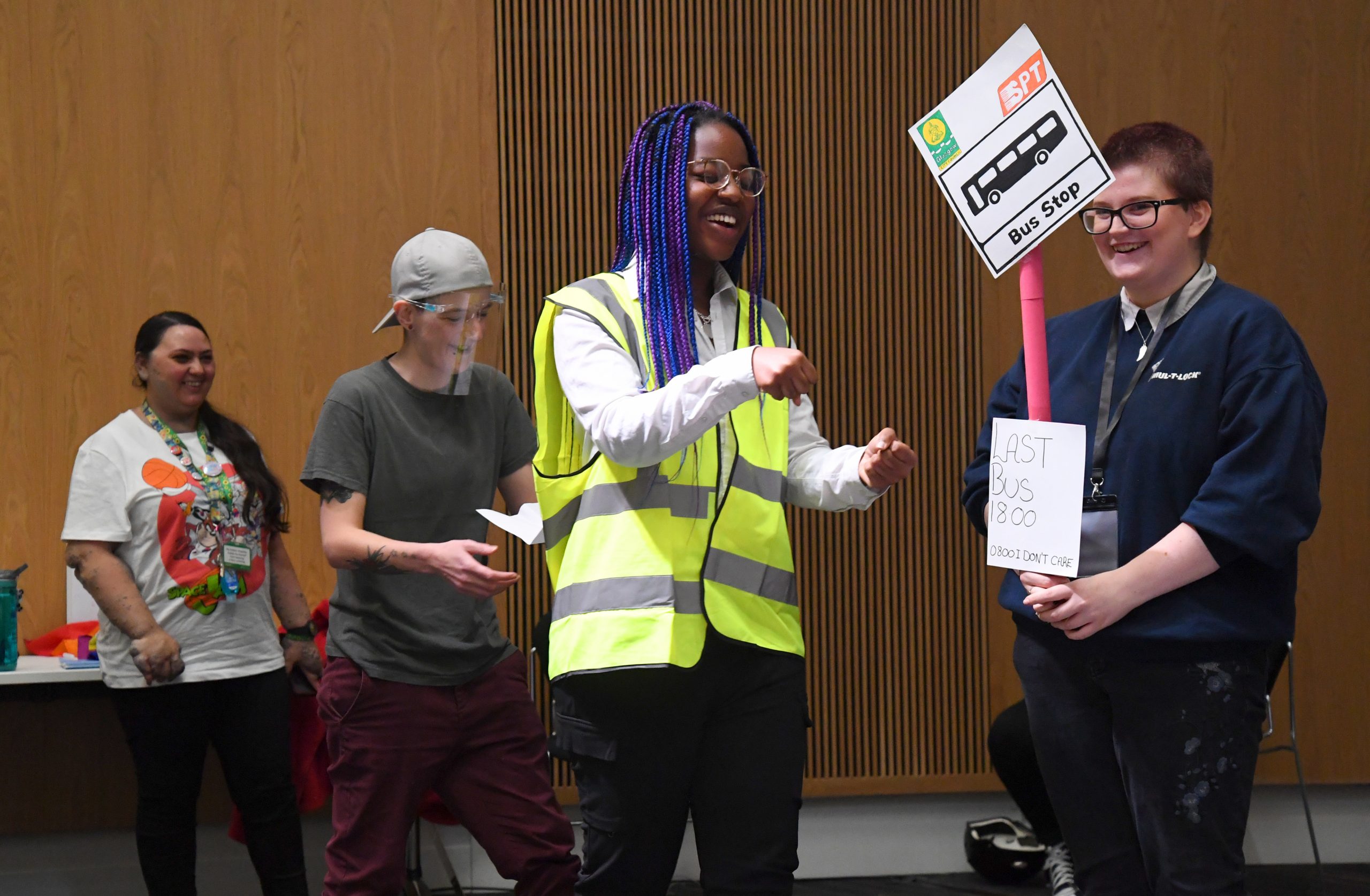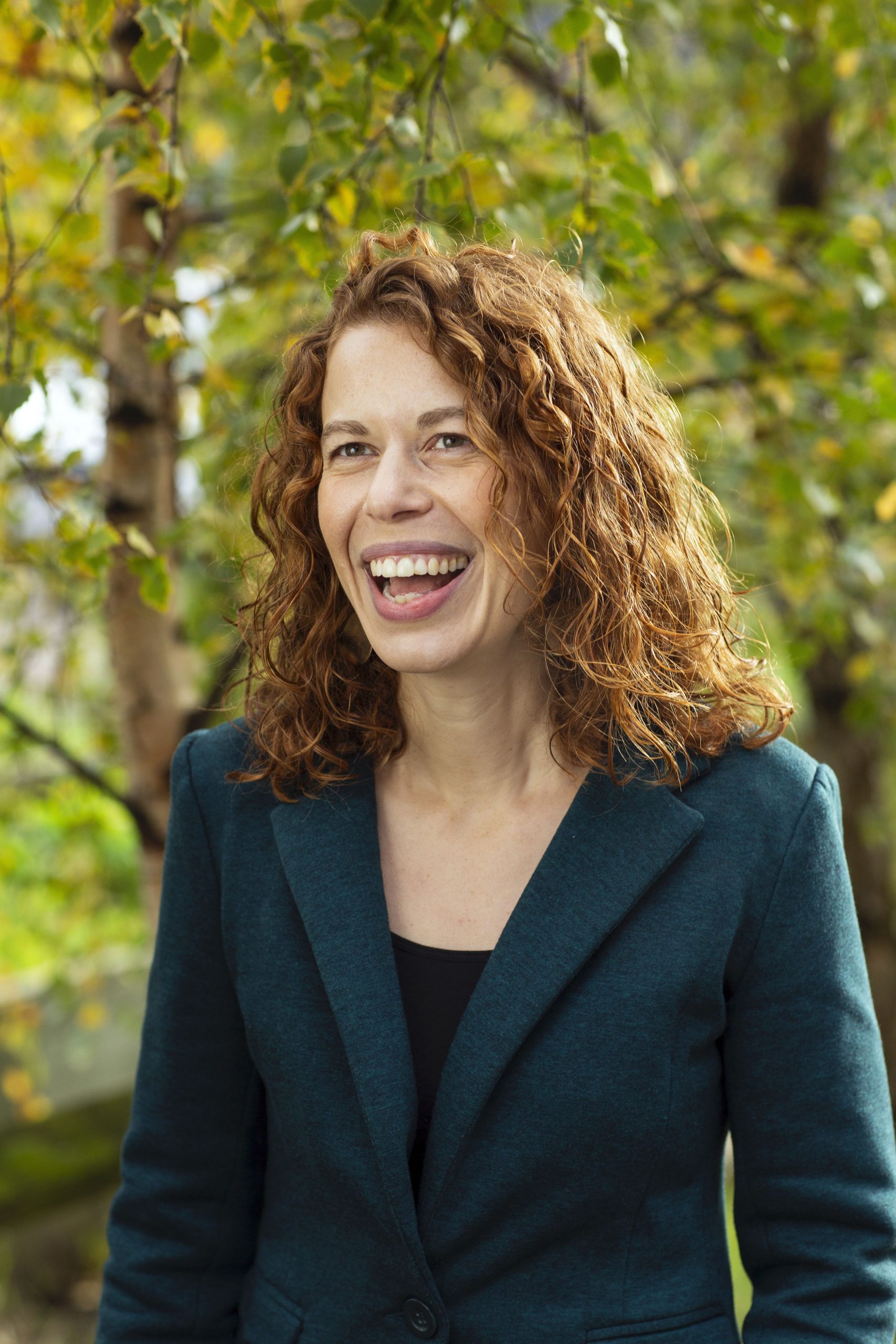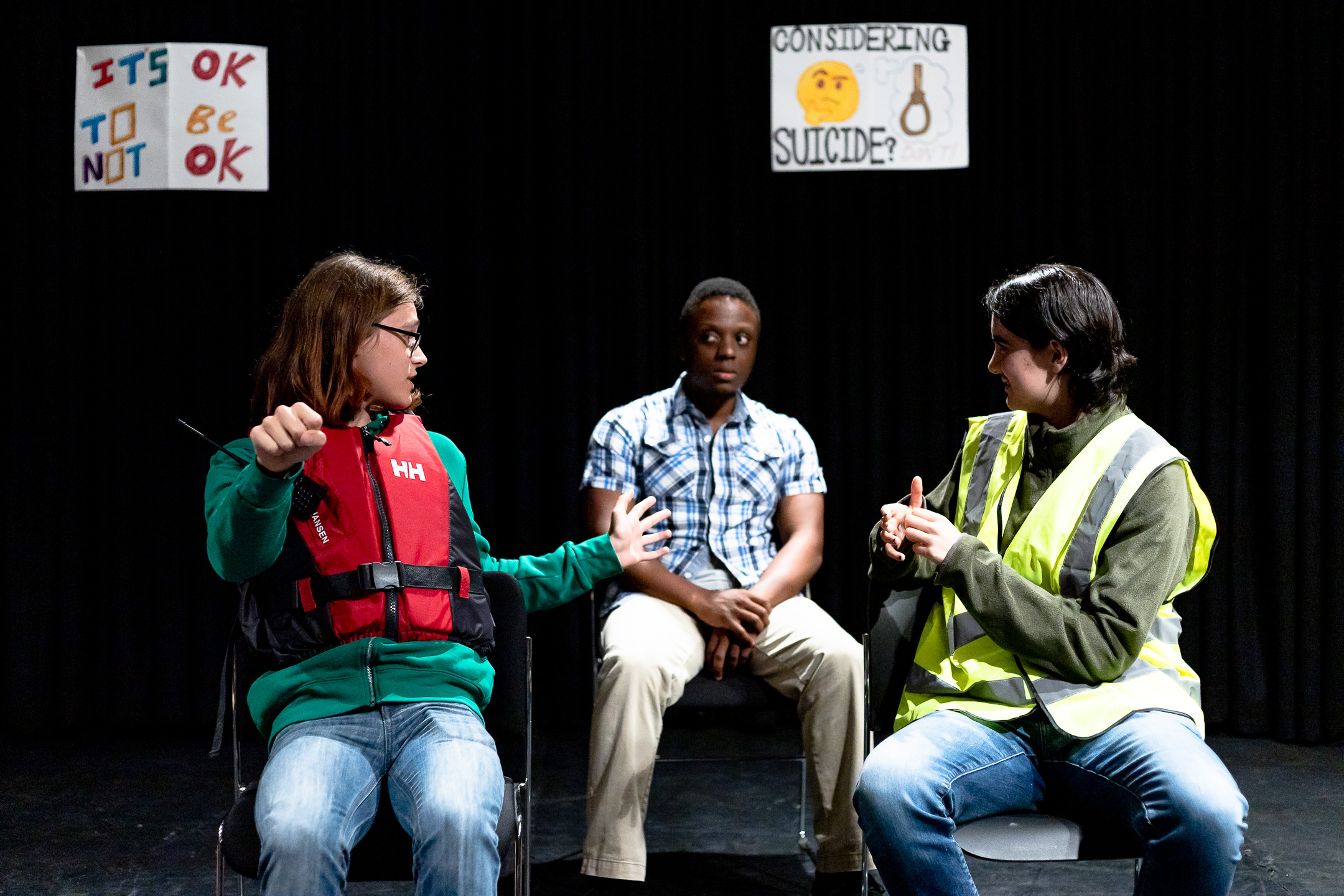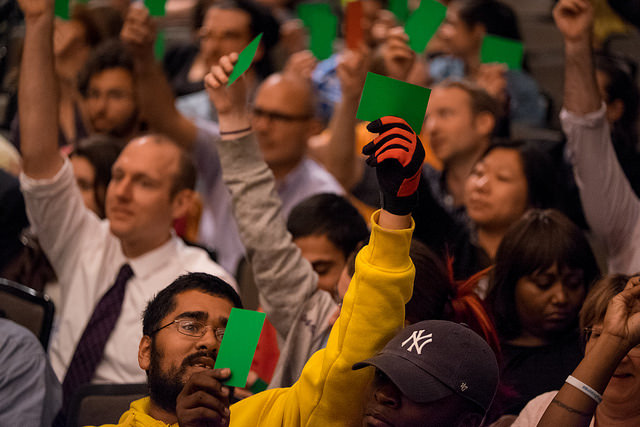How do we, as citizens, begin to participate in designing and changing policy, before we are able to articulate the relationship between what we experience in our daily lives, and the laws, rules and designs that impact those experiences? I am inspired by the frame of “citizen as a verb” offered by Baratunde Thurston on his blog “How to Citizen,” in which “citizen” is not a noun defined by nationalities or passports, but an active practice, open to everyone, within any community, whether of place (geographical or digital), of interest or practice. To citizen, like any physical or mental challenge, we build skills with continued practice. Legislative Theatre offers one such exercise program, which is accessible (and fun!) for both public-policy newbies and seasoned policymakers.
Three decades ago, Theatre of the Oppressed creator and activist-turned-city council member Augusto Boal brought a community theater performance into Rio de Janeiro’s city council chambers, inviting the public and his fellow councilors to test out changes to local legislation by improvising in the scene. During Boal’s four-year term as council member, this unorthodox and theatrical policy-making process led to the development and ratification of 13 laws in Rio, including one mandating that all state schools must provide creche facilities for the children of their teachers, workers, and students; and another ensuring that hotels charge the same rates for all couples, regardless of sexual orientation. That was the birth of the Legislative Theatre methodology, which is now practiced around the world, from New York City to Bogotá, from London to India – creative, radical, participatory democracy, built on a foundation of the ethics and techniques of Theatre and Pedagogy of the Oppressed. As Boal stated, instead of expressing only the desires of the powerful, the law can express the “desires of the people.”
In Legislative Theatre (LT), communities who are directly impacted by oppressive policies and systems devise a play that frames those problems through their lived experience and perform it for audiences of peers, neighbors, advocates, and policymakers. Then, those audiences act onstage to rehearse ways to confront the problems presented and test new policies in real time. Through these improvisations and the resulting critical dialogue between actors and “spectators,” all participants are ready to draft ideas for new policies to address the problems, working together with advocates and government representatives. Finally, audience members vote on their priorities, and decision-makers commit to immediate actions.
In 2008, I trained with Augusto Boal and colleagues at the Center for Theatre of the Oppressed- Rio. When I returned to New York City, I was particularly inspired by what I’d seen: citizens creatively and joyfully transforming institutions from the inside (via policy change) and the outside (via protest) simultaneously. From 2013-2018, I worked to develop the Legislative Theatre practice as founding executive director of Theatre of the Oppressed NYC, where our work helped shape the NYC Municipal ID law in 2014, ensuring that transgender and gender non-confirming residents could access accurate identification for city services without needing to show proof of costly medical interventions; and the NYC Cultural Plan in 2017, reducing unjust police targeting of homeless and low-income New Yorkers who sell their original artworks alongside other vendors in public places; among other examples. Since 2019, I’ve been collaborating with local governments to implement and amplify LT across the United Kingdom. Various concrete policy wins have followed directly from LT processes in the UK and internationally, including the co-creation of the first Greater Manchester Homelessness Prevention Strategy (2021-2026), in which 35 residents with experience of homelessness and hundreds of stakeholders developed twenty-three policy proposals at three LT events, all of which were included in the strategy and have already led to millions of pounds in new spending, hiring people with lived experience in local government, and more. That project won the International Observatory of Participatory Democracy 2022 Award for Best Practice in Citizen Participation, and has led to the development of an ongoing scrutiny group of community participants who continue to advise on, and critique, implementation and action plans, using theater and other participatory methods, as well as an integrated facilitation training process to build capacity for grassroots leadership.
 Other UK-based projects have led to changes including increased accessibility measures in Glasgow’s sustainable transport plans in 2021, a new streamlined hub of public services to combat rough sleeping in Haringey, London, and more youth-led design in mental health support for young people in Manchester. However, while LT and other participatory democracy methodologies should, and do, result in more equitable and effective policies and budgets, the civic activation and consciousness-raising that grow from these processes can also have lasting power.
Other UK-based projects have led to changes including increased accessibility measures in Glasgow’s sustainable transport plans in 2021, a new streamlined hub of public services to combat rough sleeping in Haringey, London, and more youth-led design in mental health support for young people in Manchester. However, while LT and other participatory democracy methodologies should, and do, result in more equitable and effective policies and budgets, the civic activation and consciousness-raising that grow from these processes can also have lasting power.
 In an LT process, community members begin by playing games that reveal, physically and emotionally, the way that rules are embedded inside us and outside in society. These games lead to discussions about the rules we are forced to follow daily, and how they might stop us from accessing our rights and living with dignity. When we talk about rules, we’re equally concerned with the very local to the international. We must examine rules we make or follow in our homes and families alongside the rules we experience in the school, the hospital, the workplace, or the parliament. These discussions lead to stories, which lead to scenes, which become tools for framing a policy problem.
In an LT process, community members begin by playing games that reveal, physically and emotionally, the way that rules are embedded inside us and outside in society. These games lead to discussions about the rules we are forced to follow daily, and how they might stop us from accessing our rights and living with dignity. When we talk about rules, we’re equally concerned with the very local to the international. We must examine rules we make or follow in our homes and families alongside the rules we experience in the school, the hospital, the workplace, or the parliament. These discussions lead to stories, which lead to scenes, which become tools for framing a policy problem.
A problem that’s ripe for LT is an institutional or governmental policy or practice — written or unwritten — that impacts participants’ lives directly and inequitably. Underlying this policy often lies a historical power imbalance: structural racism, classism, sexism, ableism, xenophobia, homophobia, transphobia, ageism, or an intersection of these oppressive ideologies. The problem is experienced by humans, and often by nature too, and requires an anti-oppressive overhaul of policy or practice. Once the actors have framed the problem in this human-centered and power-informed way, the audience can understand it both emotionally and analytically, and only then are we ready to imagine and test new policy solutions with the broader public.
In Newcastle, as part of a recent series of LT practitioner training, a group started a chant, dancing around the room: “Everything’s a Rule!” They marveled aloud at their brand-new lens: now they saw rules everywhere! One woman was driving to the workshop and heard a radio advertisement encouraging listeners to upgrade to insulated windows. She started to think about rising fuel prices, and how expensive it had become to heat her home. Who made the decision that this problem was hers alone? Why weren’t there subsidies or other interventions readily available to help residents insulate their homes? These questions could lead her and the group to further research about how the lack of infrastructure and investment in climate solutions lead to unsafe living conditions, which would form the narrative for a play.
In the rehearsals for Greater Manchester’s Homelessness Prevention Strategy project, a community actor told a story of being discharged from short-term drug and alcohol rehab without anywhere to go, when he didn’t feel that his treatment was complete; he felt dismissed by the staff person handling his case. The LT process asks us to resist the instinct to blame the front-line worker. A common solution in these instances is empathy or customer service training for staff, which keeps the focus on interpersonal relationships. Instead, we can question the rules of the rehab, the funding and commissioning process of the council, and beyond. Who sets treatment limits? Are patients consulted on the time of their discharge? Are there rules in place determining the support required before someone who may be facing homelessness is released? How much do these centers cost, and who makes the funding decisions? What messages do we receive, in school, or on TV, that housing insecurity is a personal failure, and who tells those stories? (Margaret Thatcher, for one!)
In these exercises, we begin to “zoom out” and investigate who made the rules, why they made them, where they are made, and what hidden interests might lie behind them. This investigation includes research and external expertise, but it starts with our own knowledge, eschewing the policy papers in formal political or academic language that purposely exclude us from understanding the rules that surround us. We already have much of the information we need: it’s a collective, embodied process of understanding where our shared experiences intersect with the rules.
Globally, there is growing experimentation with some models of participatory deliberative democracy, or democratic innovations. In particular, participatory budgeting and citizen assemblies selected by sortition are growing in popularity. These are often isolated events geared to specific policy proposals, which leave limited space for reflecting on the power systems behind the rules. LT intentionally creates space for this deconstruction of power hierarchies informed by the lived experience and the expertise of participants/actors. It does that in a sensory, artistic way that relies on feelings and emotions as much as rational argumentation. This helps create a shared space where we meet as human beings, and can help bridge the language gap between citizens and policymakers: thus also beginning to overturn the power dynamics between those polarized parties.
Legislative Theatre can offer an accessible, fun, and inclusive approach for citizens – in the collective and expansive definition of the word – to explore those connections between policy and daily life, and to understand them intellectually, physically, and emotionally. As part of an ecology of participatory processes, Legislative Theatre allows citizens to connect and call out policies that widen inequality. It helps communities generate new alternatives with the creativity and imagination they demand and inject much-needed joy into the process.
An earlier version of this article was originally published on the Participatory and Deliberative Democracy (PDD) blog in the United Kingdom.
Katy Rubin is an artist and civic change practitioner who is working with cities in the UK and other countries to implement and advance the Legislative Theatre process.






